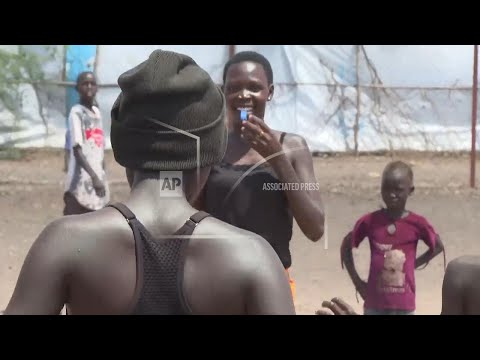(27 Jun 2025)
RESTRICTION SUMMARY:
ASSOCIATED PRESS
Kakuma, Kenya – 2 June 2025
1.Wide of dancers performing an Acholi traditional dance
2. Close up of drums being played
3. SOUNDBITE (English) John Wani, social worker at Terre Des Hommes:
++PARTLY OVERLAID WITH SHOT 4, 5 AND 6++
“We have to keep the culture alive because (of) the moral values they learn from it and also, message of peace. Convey message of peace and then conveying message of togetherness on how they can be able to socialize with other communities. That is one of them (the reason). Also, when children learn through culture they are able showcase their heritage and also even the other communities outside. So, it is something that very essential and also vital in these perspectives.”
4. Various of dancers performing routine
5. Aerial of traditional dancers performing routine
6. Mid of two ladies dancing
7. SOUNDBITE (Kiswahili) Gladis Amwony, dancer:
++PARTLY OVERLAID WITH SHOT 6, 8 AND 9++
“I got here when I was 12 years old and now I am 20. I like the traditional dance because when I was home, I liked the traditional dances.”
8. Wide of traditional dance performance
9. Close up Amwony dancing with a whistle in her mouth
10. Wide of the boys being briefed by their trainers
11. SOUNDBITE (English) John Papa, community officer at Terre Des Hommes:
++PARTLY OVERLAID WITH SHOT 12 AND 13++
“Now, we are now reducing some of the activities because we are few. The staff are few and even per day we only have one staff remaining in the centre and it is really hard for him or her to conduct 500 children."
12. Various of boys performing a routine to an afro-beat sound
13. Close up of a boy doing the hoola-hoop on his neck
STORYLINE:
Beads of sweat drip from the faces of young girls and boys as they dance to the rhythm of traditional drums and open calabashes.
These are refugee children. Some were born here in one of Africa’s largest camps.
Kakuma is located in northern Kenya, where more than 300,000 refugees’ livelihoods have been affected by funding cuts that have halved monthly food rations.
The children use the Acholi traditional dance as a distraction from hunger, perfecting a survival skill to skip lunches as they stretch their monthly food rations that are currently at 30% of the U.N nutritional recommendation per person.
The Acholi people, mostly from Uganda and South Sudan, are among refugees who live in Kakuma camp, which was established in 1992 as a safe haven for people fleeing conflict from dozens of east African countries.
The Swiss organization, Terre des hommes, manages the playground here. It’s aptly named “Furaha” — Swahili for Happiness.
John Wani, a social worker at Terre Des Hommes, says: “We have to keep the culture alive because (of) the moral values they learn from it and also, message of peace.”
But the happiness of these children isn’t guaranteed now as funding cuts have affected operations here. Less resources and fewer staff are available to engage the children and ensure their safety.
One of the dancers, Gladis Amwony, has lived in Kakuma for 8 years now. In recent years, she started taking part in the Acholi traditional dances to keep her Ugandan roots alive.
The 20-year-old doesn’t imagine ever going back to Uganda and has no recollection of life in her home village.
She says: "I like the traditional dance because when I was home, I liked the traditional dances.”
While Amwony and her friends are looking for a cultural connection, just some 5 kilometres (3 miles) away in neighbouring Kalobeyei Village 3, it’s a different story.
Find out more about AP Archive: http://www.aparchive.com/HowWeWork
Twitter: https://twitter.com/AP_Archive
Facebook: https://www.facebook.com/APArchives
Instagram: https://www.instagram.com/APNews/
You can license this story through AP Archive: http://www.aparchive.com/metadata/youtube/f8ce08eddd6f4eeda385c2929200c722
Author: AP Archive
Go to Source
News post in July 2, 2025, 9:04 am.
Visit Our Sponsor’s:
News Post In – News





